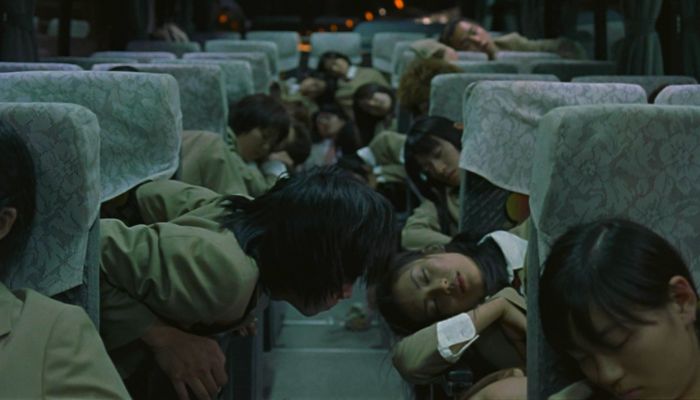Movies made in Japan are renowned for their stunning visuals, one-of-a-kind storytelling, and in-depth examination of cultural themes. The country’s cinematic history is extensive and varied. Audiences worldwide can now easily access and enjoy some of the best Japanese movies on Netflix right from their living rooms, thanks to the popularity of the streaming service.
From exemplary samurai stories to endearing family shows, Japanese films on Netflix offer something for everybody. It isn’t easy to know where to begin when there are so many titles. That’s where this blog comes in: we’ll discuss some of the best movies on Netflix and delve into the world of Japanese cinema.

Top 10 Japanese Movies On Netflix:
Our blog won’t simply zero in on the most famous or widely praised films yet additionally on unlikely treasures and less popular titles that merit more consideration. We’ll look at various genres, eras, and directors to better understand the cultural and historical contexts that make these films so special.
Join us on this journey as we look at some of the best Japanese movies on Netflix, whether you’re a fervent fan of Japanese cinema or a newcomer looking to learn more about this fascinating culture.
1. Shoplifters (2018):

Hirokazu Kore-eda directed the 2018 Japanese drama film “Shoplifters.” The film follows a needy family in Tokyo who depend on shoplifting. They try to give a young girl they find on the street a better life by taking her in, but things get complicated when their criminal activities are exposed.
The film’s subjects are family, poverty, morality, and the difficulties of modern Japan’s daily life. At the 2018 Cannes Film Festival, it was awarded the Palme d’Or for its touching and sympathetic portrayal of its characters.
“Shoplifters” includes a staggering group cast, including Lily Franky, Sakura Ando, and youngster entertainer Miyu Sasaki. Their performances give their characters depth and complexity, making the audience care deeply about their outcomes.
2. Your Name (2016):

“Your Name” is an animated film released in Japan in 2016 and directed by Makoto Shinkai. The story is about two teenagers, Taki and Mitsuha, who live in different parts of Japan but mysteriously swap bodies and lives.
Taki and Mitsuha form a connection that transcends time and space as they try to understand what is happening to them. They set out on a journey to meet each other, and along the way, they encounter difficulties.
The stunning animation, captivating plot, and emotional depth of “Your Name” have made it a household name. The film focuses on the power of human connections and themes of love and loss. It’s a lovely and endearing film that has contacted the hearts of crowds all over the planet.
Radwimps’ “Your Name” soundtrack, which has received a lot of praise as well, has become one of the best-selling soundtracks ever released in Japan.
3. Spirited Away (2001):

Studio Ghibli produced and directed the 2001 Japanese animated film “Spirited Away,” by Hayao Miyazaki. The story of Chihiro, a young girl, is told in the movie. She and her parents move to a new town, and while there, she finds herself in a magical world full of spirits and strange creatures.
As Chihiro explores this weird and wondrous world, she finds her solidarity and fortitude. She should figure out how to save her folks and get back.”Spirited Away” is known for its lovely activity, innovative narrating, and strong subjects. In addition to displaying Miyazaki’s signature whimsy and charm, the film delves into concepts of identity, personal development, and environmentalism.
Rumi Hiiragi, Miyu Irino, and Mari Natsuki are among the incredible voice actors in the film, each of whom brings their characters to life with nuance and depth. Joe Hisaishi’s stunning score for the movie also contributes to the story’s enchanting atmosphere and emotional resonance.
4. Battle Royale (2000):

Kinji Fukasaku was the director of the action-thriller “Battle Royale” in 2000. The movie takes place in a dystopian future where the government has enacted a law known as the Battle Royale Act that requires a class of high school students to compete in a bloody fight to the death on an island that has been deserted.
The story follows a gathering of understudies who should explore the hazardous territory of the island while battling against one another and attempting to get by. The movie is a satire on social issues like teenage violence, control by the government, and losing one’s innocence.
The intense action scenes, shocking violence, and complex “Battle Royale” characters make it so popular. It was exceptionally questionable upon its delivery because of its realistic substance and subjects, however, has since turned into a clique exemplary and a milestone film in Japanese film.
5. Silence (2016):

Based on Shusaku Endo’s 1966 novel, Martin Scorsese directed the 2016 historical drama film “Silence.” The story of two Jesuit priests, played by Andrew Garfield and Adam Driver, who travel to Japan to find their mentor, Liam Neeson, and spread Christianity is set in 17th-century Japan.
The ruling government, determined to eradicate Christianity from Japan, persecuted and attacked the priests. The priests wrestle with their faith and the morality of their mission as they witness the suffering and torture of Japanese Christians.
Beautiful cinematography, riveting performances, and potent themes make “Silence” a classic. The film asks provocative questions about the nature of faith and the human experience as it examines the complex intersection of religion, culture, and colonialism.
6. Tokyo Story (1953):

Yasujir Ozu directed the 1953 Japanese drama film “Tokyo Story.” In the movie, an elderly couple travels from their rural hometown to Tokyo to visit their adult children. However, when they arrive, they discover their children are too preoccupied with their lives to spend time with them.
The film explores family, aging, and the difficulties of modernity as the couple struggles to connect with their children and find their place in the rapidly changing world around them. The quiet, contemplative style of “Tokyo Story” is well-known for its deeply moving portrayal of ordinary people and everyday life.
An ensemble of talented actors, including Chishu Ryu and Setsuko Hara, give nuanced and moving performances that capture the complexity of their characters’ experiences and emotions. “Tokyo Story” lastingly affects the film’s universe, impacting the ages of producers and filling in as a standard for films about family and human association.
7. Departures (2008):

“Departures” is a 2008 Japanese show movie coordinated by Yōjirō Takita. Masahiro Motoki plays a young cellist named Daigo Kobayashi in the movie. After his orchestra breaks up, Daigo Kobayashi loses his job. He works as an “encoffiner,” who prepares deceased bodies for burial in search of money.
As Daigo wrestles with his new calling, he figures out how to see the value in the magnificence and significance of the encoffining custom and finds another feeling of direction and importance in his life. “Departures” is known for its powerful and touchy investigation of death, distress, and the human condition. The movie reflects on how we confront mortality, come to terms with it, and find meaning and connection amid loss.
The film includes an exceptional cast, with Motoki conveying a strong and nuanced execution as Daigo. The film’s cinematography and direction are also outstanding, capturing the solemnity and beauty of the burial ceremony with grace and sensitivity.
8. Train Man (2005):

Based on the popular internet forum thread “Densha Otoko”, “Train Man”, a movie based on a true story about a shy, geeky young man who falls in love with a woman he meets on a train, the romantic comedy film “Train Man” was released in Japan in 2005.
Tsuyoshi Yamada, played by Takayuki Yamada, is a socially awkward computer engineer who falls in love with a woman he rescues from a drunken train passenger. Tsuyoshi receives guidance on pursuing the woman and winning her heart from the community of online forum users.
The charming and quirky plot of “Train Man” is well-known, as is its investigation of love and social anxiety. The story, which focuses on the transformative power of love and the power of community, is uplifting and heartwarming. The movie has a talented ensemble cast that includes Yamada, Tae Kimura, Miki Nakatani, and others.
9. The Outsider (2018):

Jared Leto stars in the Japanese-American crime thriller “The Outsider,” released in 2018 and directed by Martin Zandvliet. Nick Lowell, an American soldier released from prison following World War II and involved in the criminal underworld of postwar Japan, is the movie’s subject.
Nick must navigate the Yakuza’s intricate web of alliances, rivalries, and traditions as he progresses through the ranks. En route, he shapes a bond with a Yakuza part named Kiyoshi, played by Tadanobu Asano, and starts to scrutinize the ethical quality of his decisions.
The Yakuza underworld is vividly and graphically depicted in “The Outsider,” exploring themes of loyalty, identity, and belonging. The cultural clashes and power struggles that shaped Japan after the war is presented in the film in a nuanced and thought-provoking manner.
10. Our Little Sister (2015):

Hirokazu Kore-eda directed the 2015 drama film “Our Little Sister.” The movie focuses on Sachi, Yoshino, and Chika, three sisters. They share a large house in Kamakura, a coastal town south of Tokyo. The sisters attend their estranged father’s funeral and meet Suzu, their half-sister, for the first time. Suzu accepts the invitation to live with them.
The film follows the sisters as they welcome Suzu into their lives and home, as well as they each overcome their obstacles. They learn more about their family history and father’s life as they get to know Suzu.
The beautiful cinematography of “Our Little Sister” is well-known for its tender and genuine depiction of family dynamics. The film offers a sincere and moving look at the bond between siblings and explores themes of love, loss, and forgiveness.
The lead actresses, Haruka Ayase, Masami Nagasawa, Kaho, and Suzu Hirose, all deliver outstanding performances that contribute to the richness and nuance of the characters’ lives.
11. Like Father, Like Son (2013):

Hirokazu Kore-eda directed the 2013 Japanese drama film “Like Father, Like Son.” The story of two families who learn that their six-year-old sons were switched at birth is told in the movie. The meaning of parenthood, the bonds that bind families, and themes of nature versus nurture are examined in the film.
Two fathers are the movie’s focus: Yudai, who owns and operates a small electrical shop, and Ryota, a successful businessman. The fact that both of their sons were switched at birth forces their fathers to consider what it means to be a parent and what constitutes a family.
The families learn more about one another and their respective parenting styles as they spend more time together. Ryota battles to interface with his natural child, while Yudai has a more lighthearted way of dealing with nurturing.
12. Millennium Actress (2001):

Satoshi Kon directed the 2001 Japanese anime film “Millennium Actress.” The film follows Genya Tachibana, a documentary filmmaker, as she attempts to make a documentary about the life of retired actress Chiyoko Fujiwara. As Chiyoko tells her life story, Tachibana and his cameraman are transported back to relive her memories.
The power of storytelling and themes of memory are the focus of the film. The audience is taken on a journey through various periods of Japanese history, from feudal Japan to the present, as Chiyoko recounts her life story. The line between reality and fantasy blurs as she does so.
“Millennium Actress” has stunning animation that combines computer-generated effects with traditional hand-drawn animation to create a distinctive and striking style. Susumu Hirasawa’s soundtrack, which perfectly reflects the film’s themes and mood, is another standout feature.
Conclusion:
Audiences from all over the world can be entertained and captivated by various Japanese movies on Netflix. The meticulous attention to detail, stunning visuals, and thought-provoking storytelling that can make us laugh, cry, and ponder our own lives are all hallmarks of Japanese cinema.
Numerous outstanding Japanese films on Netflix are just waiting to be discovered, in addition to the ones mentioned in this blog. Therefore, why not explore today’s vibrant film culture and discover your new favorite Japanese film?
Hi! I am Nabieha Khusro, a content writer and voracious reader with a passion for creating compelling and engaging content. I have 3 years of experience writing for various industries, including fashion, education, and creative content writing. When I am not writing, I enjoy playing my ukulele and trying new cuisines.




![20 Best Netflix Alternatives in 2024 [Free and Paid] Best Alternatives To Netflix](https://www.newvisiontheatres.com/wp-content/uploads/2022/11/Best-alternative-to-netflix-200x114.png)

